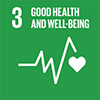A possible relationship between the presence of a specific type of bacteria found in tumours and the spread of bowel cancer has been identified by researchers at RCSI University of Medicine and Health Sciences.
Bowel cancer presently accounts for approximately 10% of new cancer cases diagnosed (1.9 million cases, WHO 2020).
Published in the leading gastroenterology journal Gut, this collaborative study with Queen's University Belfast suggests that there is a direct relationship between the presence of a bacteria called Fusobacterium nucleatum and the spread of bowel cancer resulting in poorer outcomes for a subset of patients.
The researchers found that a collection of bacteria that normally lives in the oral cavity is able to infect bowel tumours, changes how tumour cells behave, and triggers the spread of the tumour to other organs. They showed how they can use genomic sequencing to detect traces of an infection with bacteria or other microbes in patients’ tumours that previously would have been undetectable.
The researchers say that this finding can help clinicians to identify patients at risk of poorer outcomes and make decisions on treatment options for patients with bowel cancer whose tumours are infected with the bacterium Fusobacterium nucleatum.
They hope that this finding will enhance diagnostics to improve the efficacy of current treatment and help further advance the use of new therapeutics for patients’ tumours infected with this bacterium.
The research was led by Professor Jochen Prehn, Professor of Physiology and Director of the Centre for Systems Medicine at RCSI. It was supported by RCSI and the Irish Centre for High-End Computing (ICHEC) and funded by the Health Research Board, Science Foundation Ireland and the Northern Ireland Department for the Economy (NI DfE).
RCSI is committed to achieving a better and more sustainable future through the UN Sustainable Development Goals.

